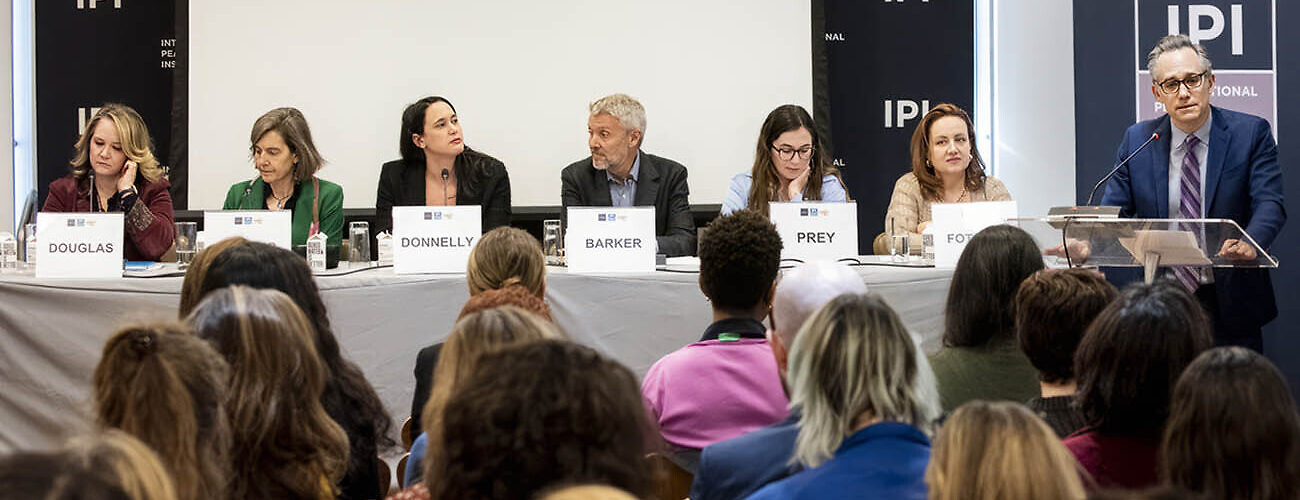Ahead of the UN Security Council’s Open Debate on Women, Peace and Security, IPI co-hosted a panel discussion on October 23rd with the New Lines Institute and Equimundo. The event entitled “Understanding Masculinities to Dismantle Patriarchal Power Structures” was organized in response to the Secretary General’s call to dismantle patriarchal power structures in his New Agenda for Peace policy brief. The panel featured representatives from member states, UN agencies, and civil society discussing patriarchal structures, masculinities, and the Women, Peace and Security (WPS) agenda.
Arlene B. Tickner, Deputy Permanent Representative of Colombia to the UN, opened the discussion by advocating for a shared definition of patriarchy and masculinity because we can’t dismantle something we do not understand. She described patriarchy as “a political-social system rooted in socially defined gender roles that operates to create both oppression and privilege.” Ambassador Tickner went on to explain that patriarchy insists that certain men, particularly those who are heteronormative and white, are naturally superior to those perceived as weak, in particular females (including trans women). This system grants them the inherent right to dominate and rule through distinct forms of power and violence.
Kat Fotovat, Principal Deputy Director of the Office of Global Women’s Issues for the U.S. Department of State, emphasized the importance of engaging men and boys in the promotion of the rights of women and girls through US foreign policy. She recognized the pervasiveness of patriarchal structures, describing patriarchy as “vast and insidious, replicated and made invisible by the nature of having existed for centuries.” She called for institutionalized policies and programming that recognize how gender-based violence and gender inequality are fundamentally rooted in unequal power structures that prioritize men.
Gary Barker, President of Equimundo, identified men’s increasing economic marginalization as a key driver of the global regression in gender equality. Economic vulnerabilities, he explained, breed resistance from men, allowing far-right groups to instrumentalize these feelings of loss in their messaging against gender equality.
Sarah Douglas, Deputy Chief of the Peace and Security section at UN Women, noted that global military budgets have exceeded previous records for the 8th consecutive year, reaching a level of $2.2 trillion. At the same time, funding for women’s organizations in conflict zones has decreased from 0.5% to 0.3% of Official Development Assistance (ODA) in fragile settings. She noted that male-dominated approaches to peace and security, which prioritize militarized responses, have contributed to the current conflict-ridden state of the world.
Emily Prey, Director of the WPS Portfolio at the New Lines Institute, emphasized the role of research in advancing the effectiveness of policy and conflict prevention programs. She noted that decades of research show that patriarchy is a net negative for society, which is why it is vital to educate men and boys to gain their support for dismantling the structures that ultimately harm all of society in the long term.
Dean Peacock, Director of the Mobilizing Men for Feminist Peace Initiative of WILPF, redirected attention to the legacies of colonialism and land dispossession in the Global South as a fundamental challenge to building a far-reaching movement that attracts both men and women to advocate for gender equality. He stressed the importance of contextualization to address structural factors that contribute to gendered harms in conflict settings.
Speakers offered innovative strategies for advocating, mobilizing political will, promoting education, developing programming, securing funding, and conducting research, related to masculinities and gender equality, all of which will be necessary to dismantle patriarchal systems.
Welcoming Remarks:
Adam Lupel, Vice President and COO, International Peace Institute
Speakers:
H.E. Arlene B. Tickner, Deputy Permanent Representative of Colombia to the UN
Kat Fotovat, Principal Deputy Director, Office of Global Women’s Issues, US Department of State
Gary Barker, President and CEO, Equimundo: Center for Masculinities and Social Justice
Sarah Douglas, Deputy Chief of UN Women
Emily Prey, Director of the Gender Policy Portfolio at New Lines Institute
Dean Peacock, Director of the Mobilizing Men for Feminist Peace Initiative, WILPF
Moderator:
Phoebe Donnelly, Senior Fellow and Head of the Women, Peace, and Security Program, International Peace Institute








